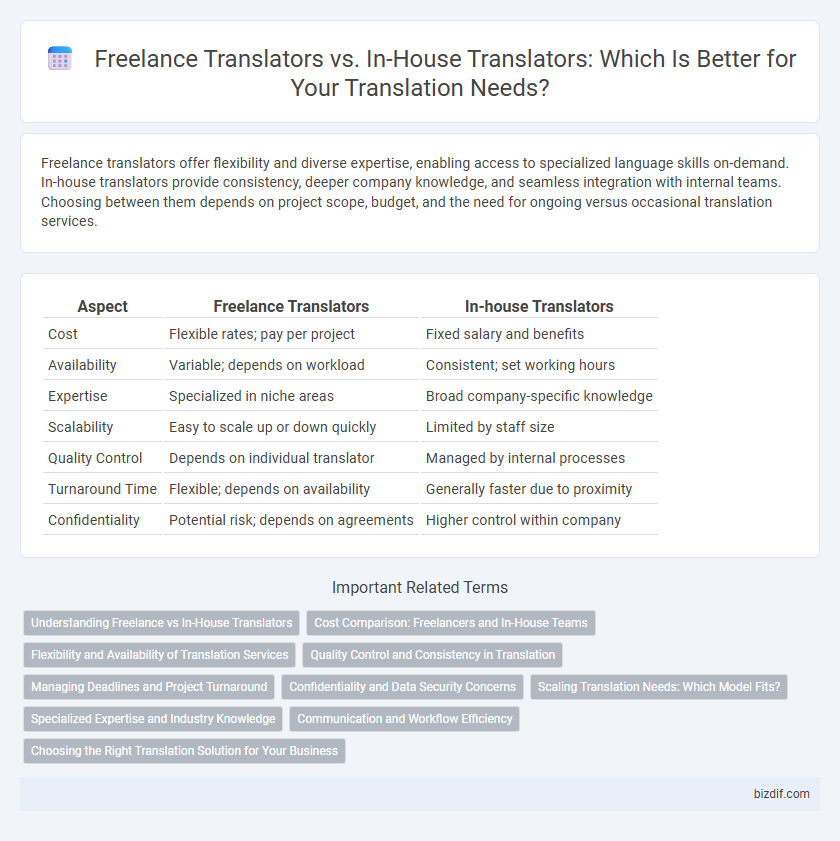Freelance translators offer flexibility and diverse expertise, enabling access to specialized language skills on-demand. In-house translators provide consistency, deeper company knowledge, and seamless integration with internal teams. Choosing between them depends on project scope, budget, and the need for ongoing versus occasional translation services.
Table of Comparison
| Aspect | Freelance Translators | In-house Translators |
|---|---|---|
| Cost | Flexible rates; pay per project | Fixed salary and benefits |
| Availability | Variable; depends on workload | Consistent; set working hours |
| Expertise | Specialized in niche areas | Broad company-specific knowledge |
| Scalability | Easy to scale up or down quickly | Limited by staff size |
| Quality Control | Depends on individual translator | Managed by internal processes |
| Turnaround Time | Flexible; depends on availability | Generally faster due to proximity |
| Confidentiality | Potential risk; depends on agreements | Higher control within company |
Understanding Freelance vs In-House Translators
Freelance translators offer flexible, project-based services with diverse language expertise, ideal for businesses needing varied or occasional translation tasks. In-house translators provide consistent, company-specific knowledge and quicker turnaround times, essential for maintaining brand voice and handling confidential materials. Choosing between freelance and in-house translators depends on project volume, budget constraints, and the need for specialized industry knowledge.
Cost Comparison: Freelancers and In-House Teams
Freelance translators typically offer cost advantages due to lower overhead expenses and flexible project-based rates, making them ideal for businesses with variable translation needs. In-house translators require fixed salaries, benefits, and ongoing training, resulting in higher overall costs but ensuring consistent quality and faster turnaround for frequent projects. Companies must evaluate their translation volume and budget to choose between the scalable affordability of freelancers and the reliability of in-house teams.
Flexibility and Availability of Translation Services
Freelance translators offer unparalleled flexibility and can adjust their schedules to meet urgent or off-hour translation needs, ensuring continuous availability for diverse projects. In-house translators provide consistent access to company-specific terminology and faster turnaround times during regular business hours but may lack the ability to handle sudden workload spikes. Combining both freelance and in-house translators often maximizes efficiency by balancing specialized expertise with on-demand availability.
Quality Control and Consistency in Translation
Freelance translators offer flexibility but may pose challenges in maintaining consistent quality control due to varying expertise and lack of centralized oversight. In-house translators benefit from standardized processes and continuous collaboration, enhancing consistency and alignment with brand voice across all translated materials. Implementing rigorous quality assurance protocols is essential for both to ensure accuracy and uniformity in multilingual content.
Managing Deadlines and Project Turnaround
Freelance translators offer flexible scheduling, enabling rapid adjustments to tight deadlines, while in-house translators benefit from consistent workflows and immediate team communication, which streamlines project turnaround. Effective deadline management relies on clear communication tools and project management software to track progress and prioritize tasks across both freelance and in-house settings. Combining the agility of freelancers with the stability of in-house teams can optimize the overall translation project turnaround time and ensure timely delivery.
Confidentiality and Data Security Concerns
Freelance translators often pose higher confidentiality and data security risks due to varied work environments and potentially less stringent oversight compared to in-house translators who operate within controlled company networks and standardized security protocols. In-house translators benefit from direct access to proprietary systems and can be subject to regular security audits, reducing the likelihood of data breaches. Companies prioritizing sensitive information tend to favor in-house translation teams to ensure compliance with industry regulations and maintain robust confidentiality standards.
Scaling Translation Needs: Which Model Fits?
Freelance translators offer flexible scaling by providing on-demand expertise for fluctuating workloads, making them ideal for projects with variable volume or specialized language needs. In-house translators deliver consistent quality and faster turnaround times suited for companies with steady translation demands and strict confidentiality requirements. Choosing the right model depends on balancing scalability, cost efficiency, and control over translation processes.
Specialized Expertise and Industry Knowledge
Freelance translators often bring specialized expertise in niche industries such as legal, medical, or technical fields, offering tailored language solutions that meet specific client needs. In-house translators typically have deeper industry knowledge tied closely to company products and services, enabling seamless integration with internal teams and consistent brand messaging. Companies seeking precision and industry-specific terminology benefit from the complementary strengths of freelance specialists and dedicated in-house translators.
Communication and Workflow Efficiency
Freelance translators offer flexible communication channels, often leveraging digital tools to facilitate rapid client interaction and adaptable scheduling. In-house translators benefit from direct access to internal teams, enabling streamlined workflow integration and immediate feedback loops. Workflow efficiency improves in-house through centralized project management, while freelancers rely on self-managed processes and clear client guidelines to maintain deadlines and quality.
Choosing the Right Translation Solution for Your Business
Freelance translators offer flexibility, cost-effectiveness, and access to specialized language expertise, making them ideal for projects with variable workloads or niche subjects. In-house translators provide consistent quality control, immediate communication, and deeper integration with company culture, which benefits businesses requiring ongoing, brand-sensitive translation work. Evaluating factors such as project volume, budget constraints, subject matter complexity, and speed requirements will help determine whether freelance or in-house translation services best align with your business goals.
Freelance Translators vs In-house Translators Infographic

 bizdif.com
bizdif.com